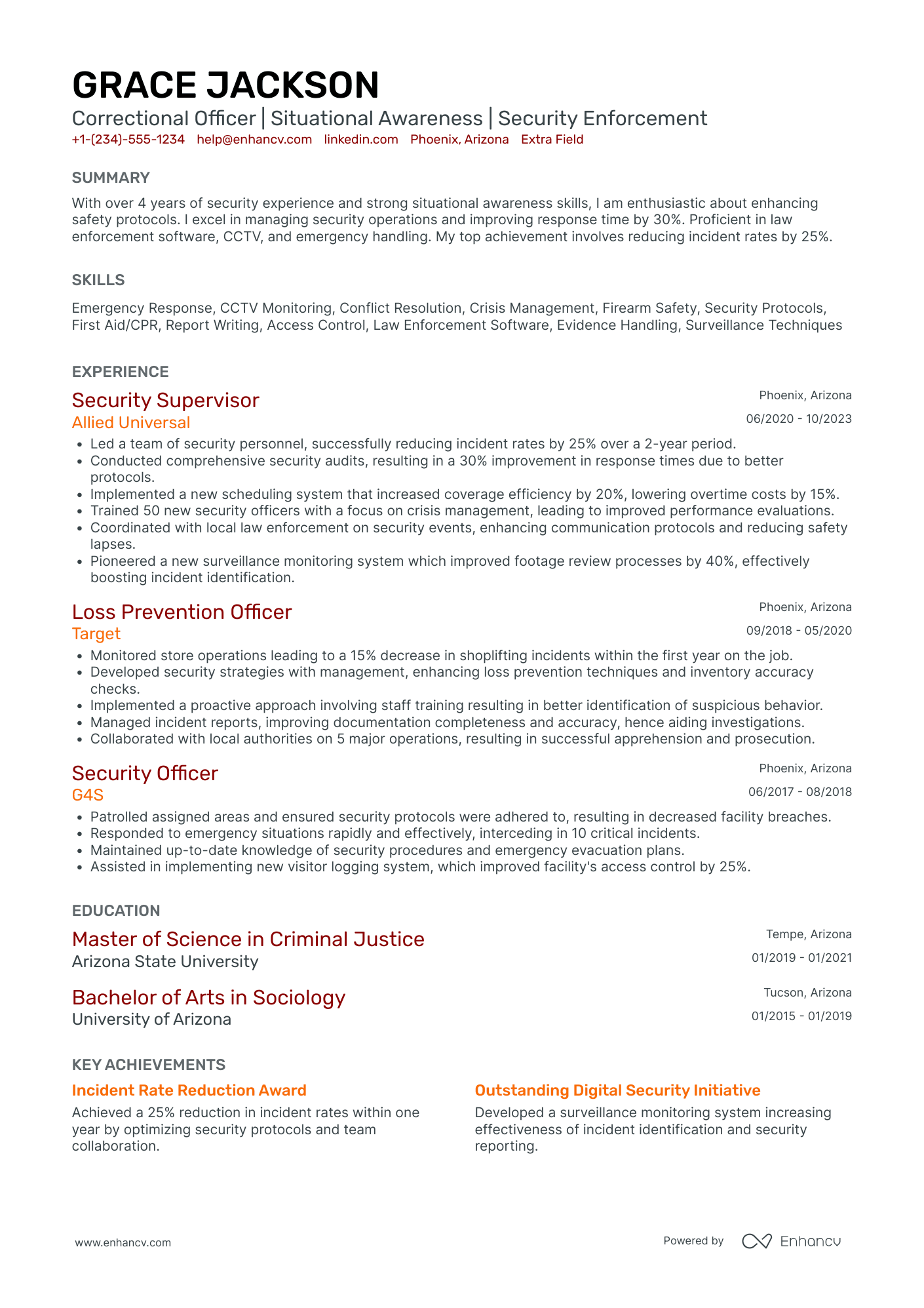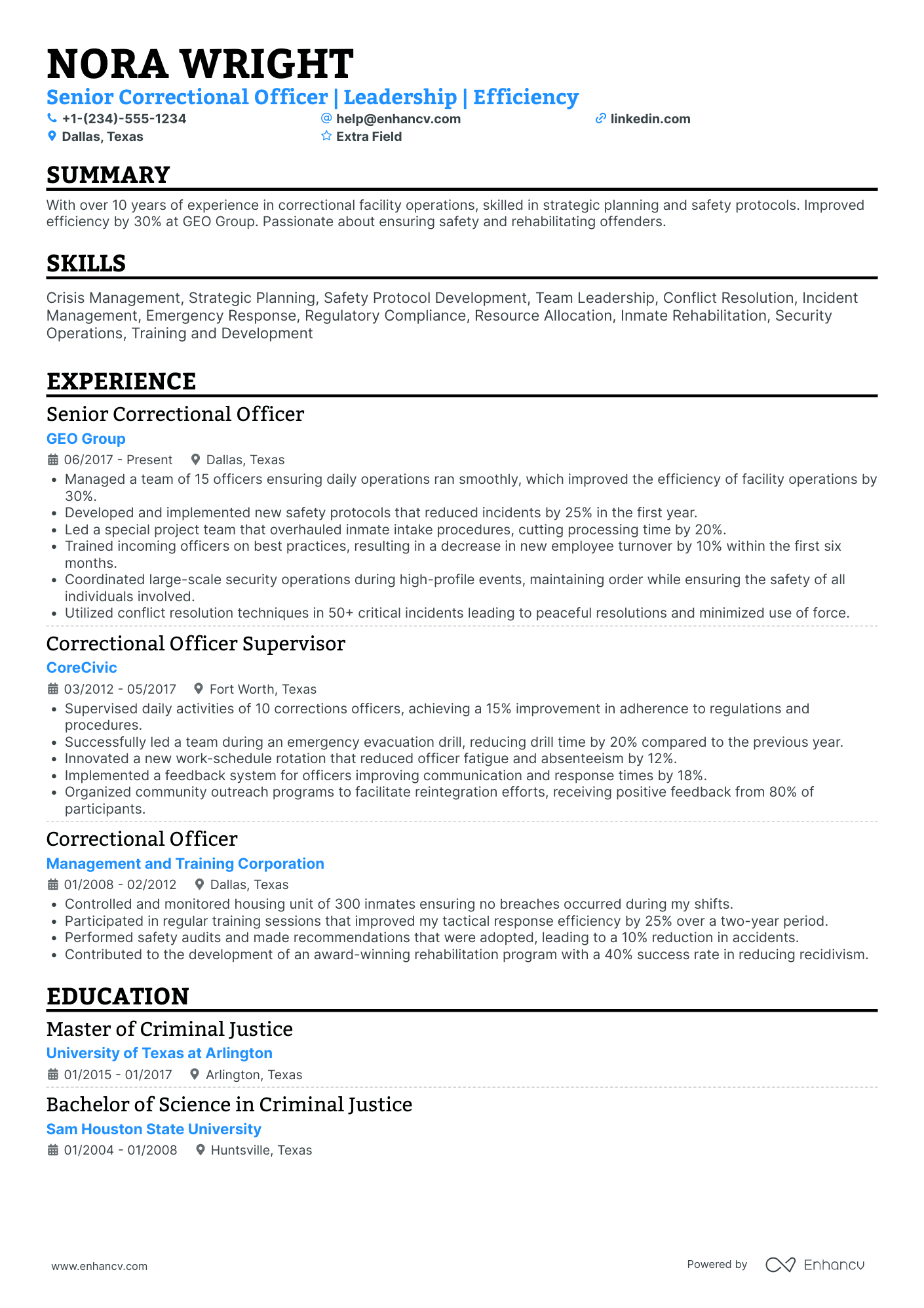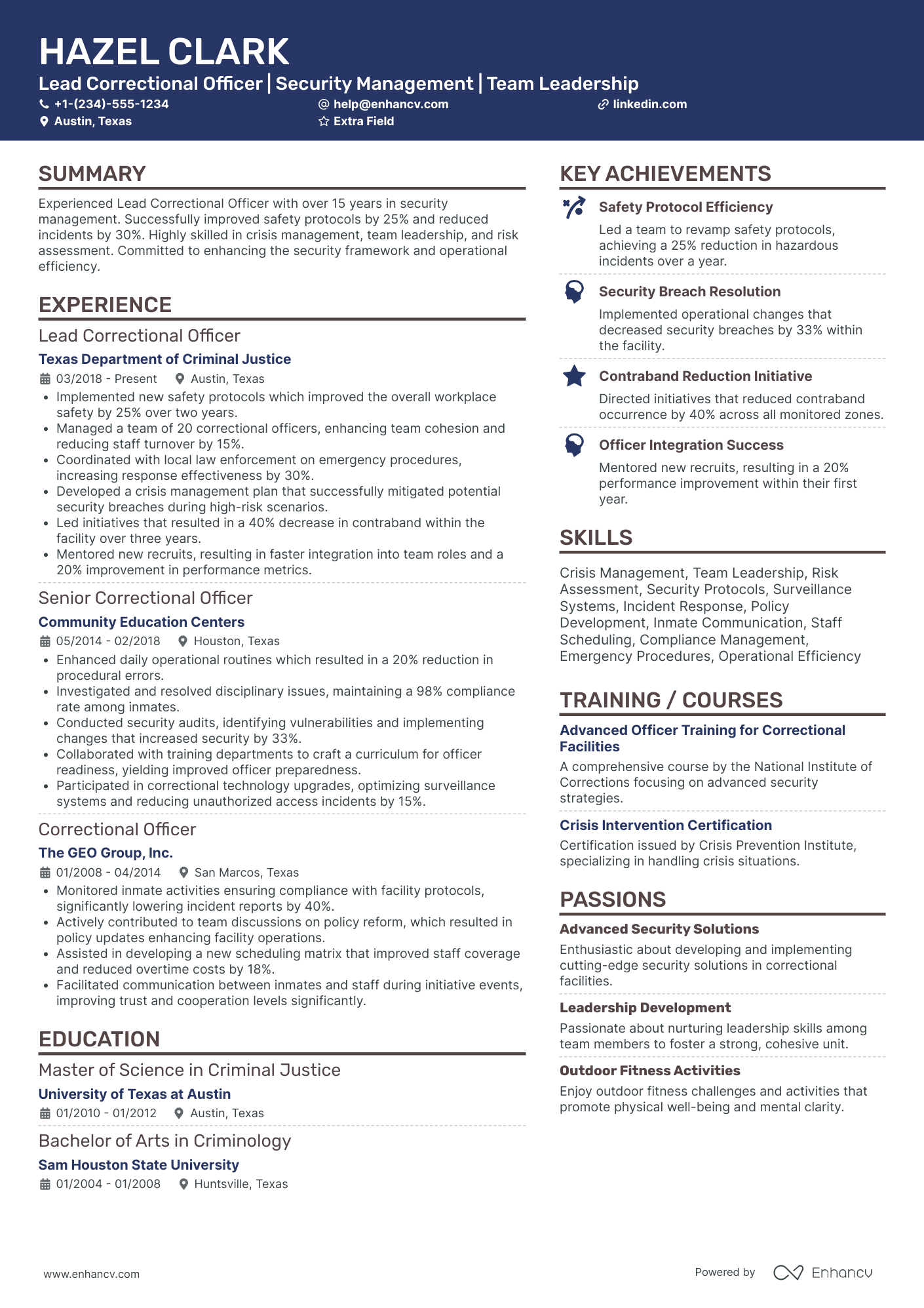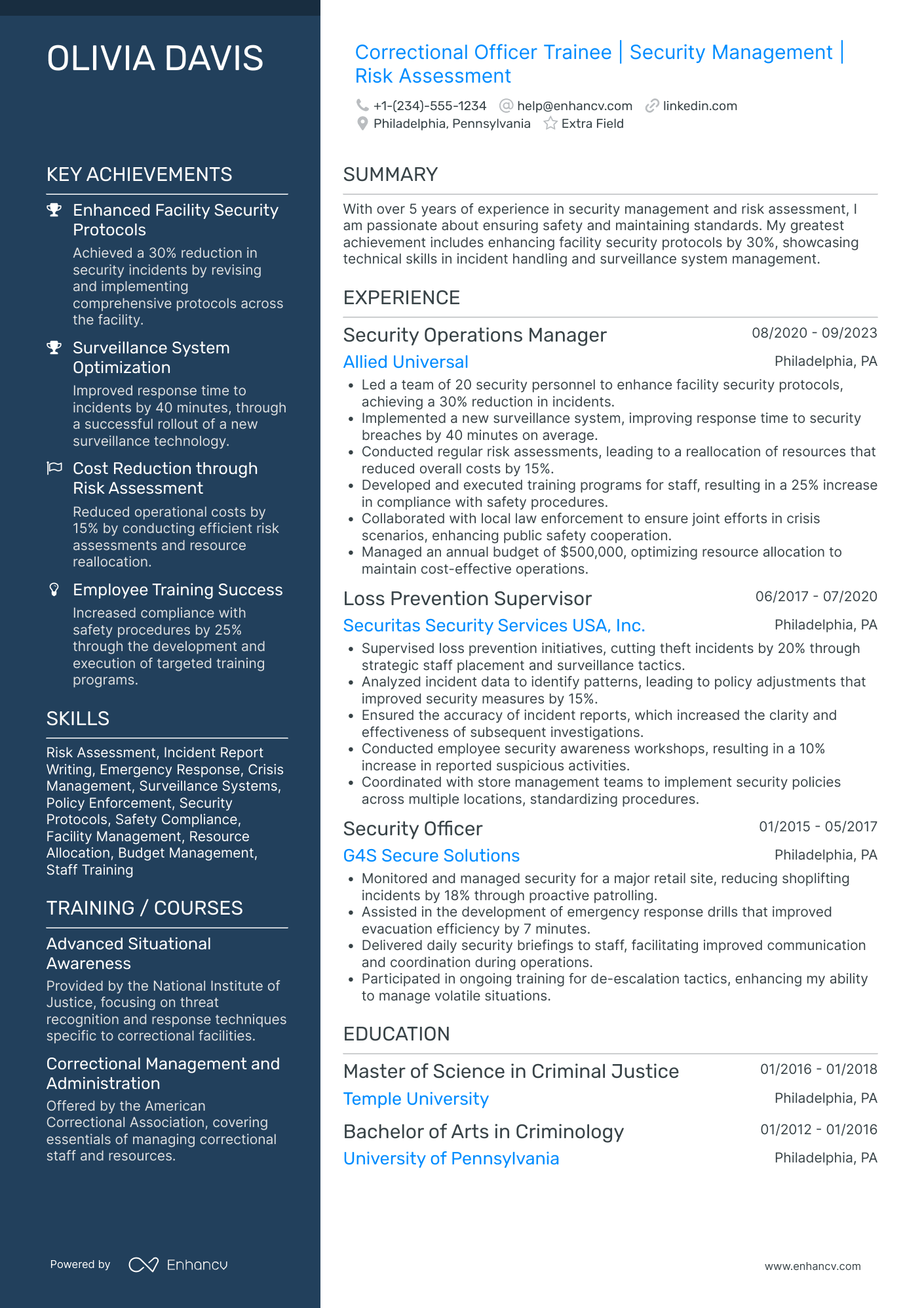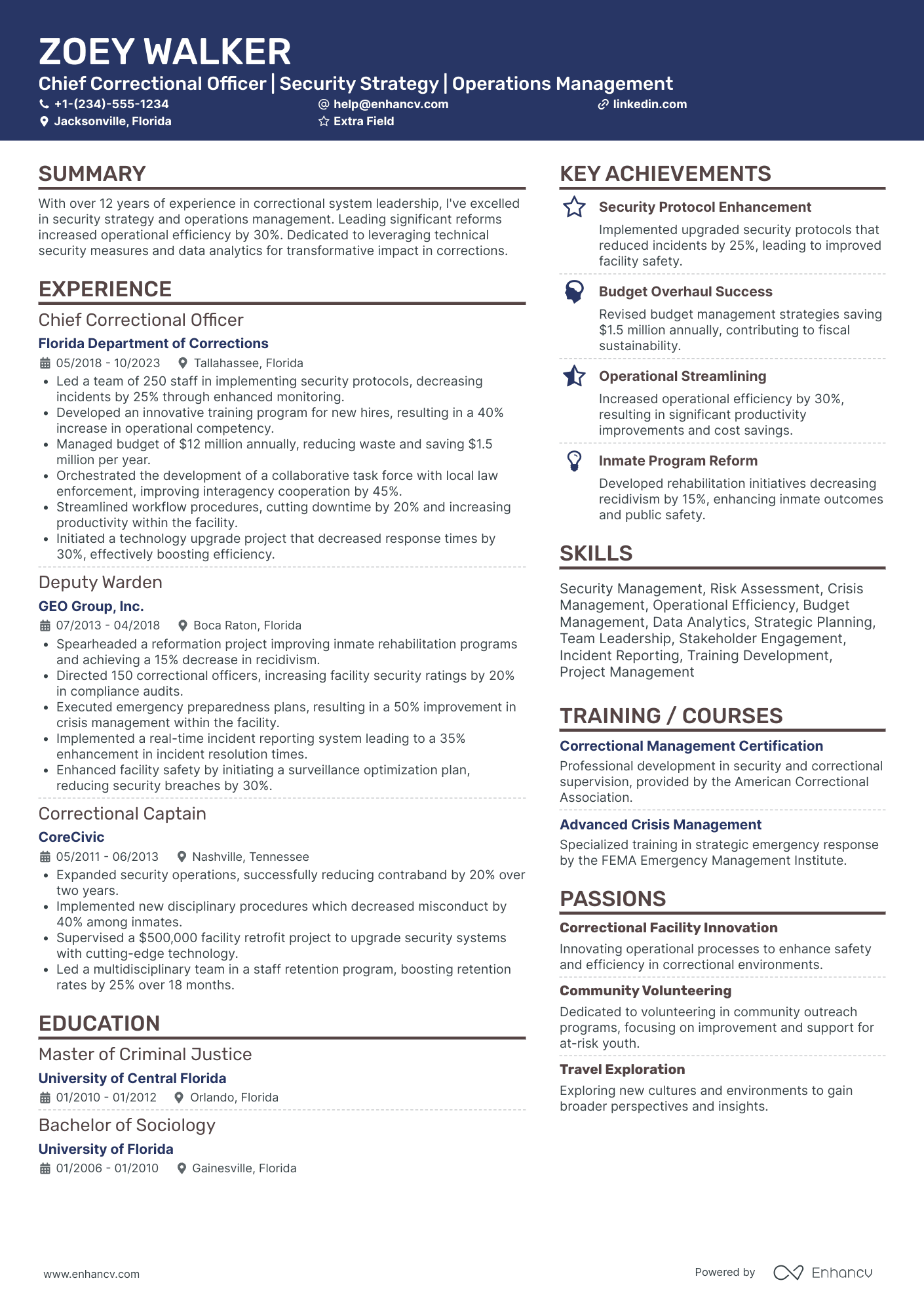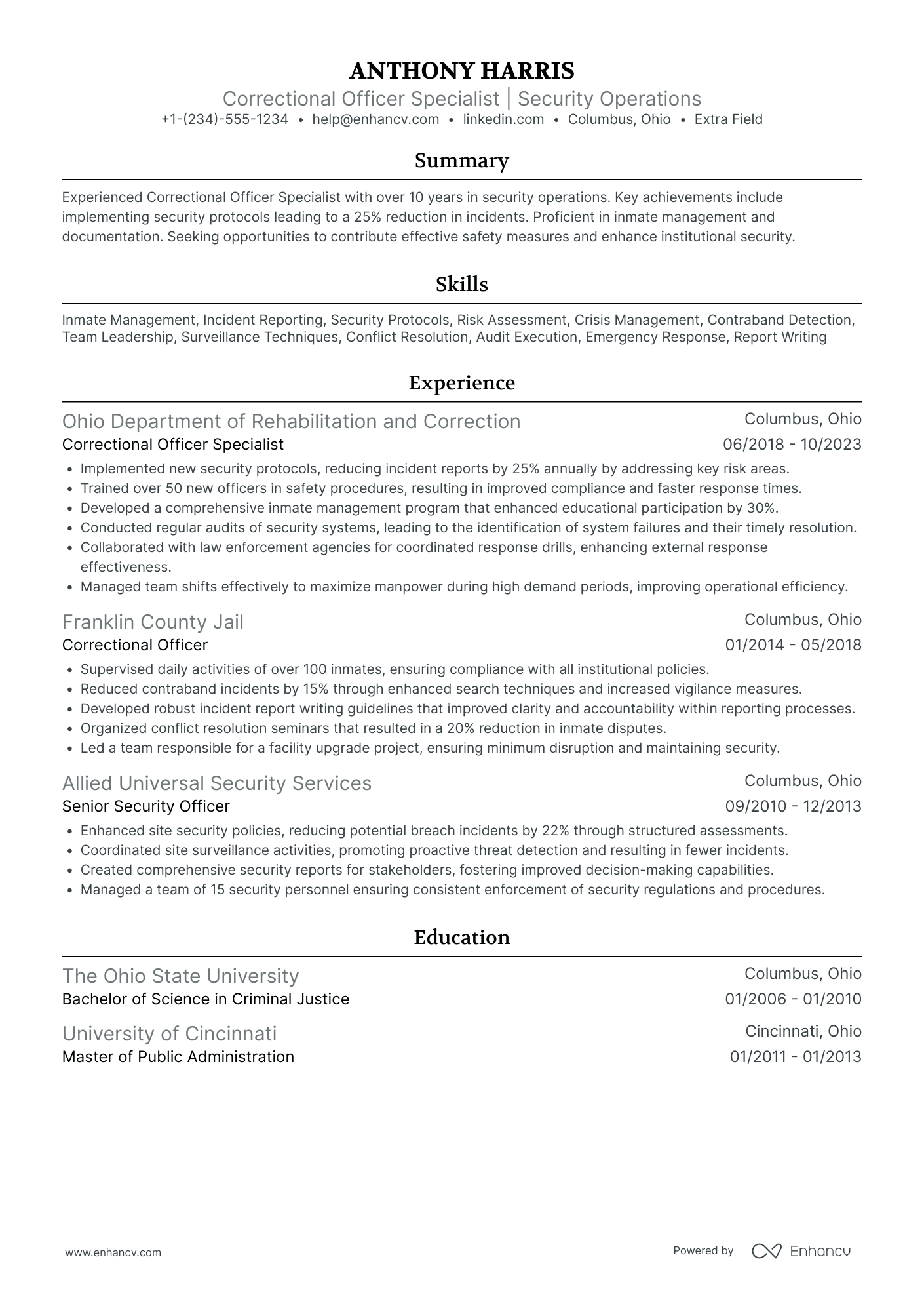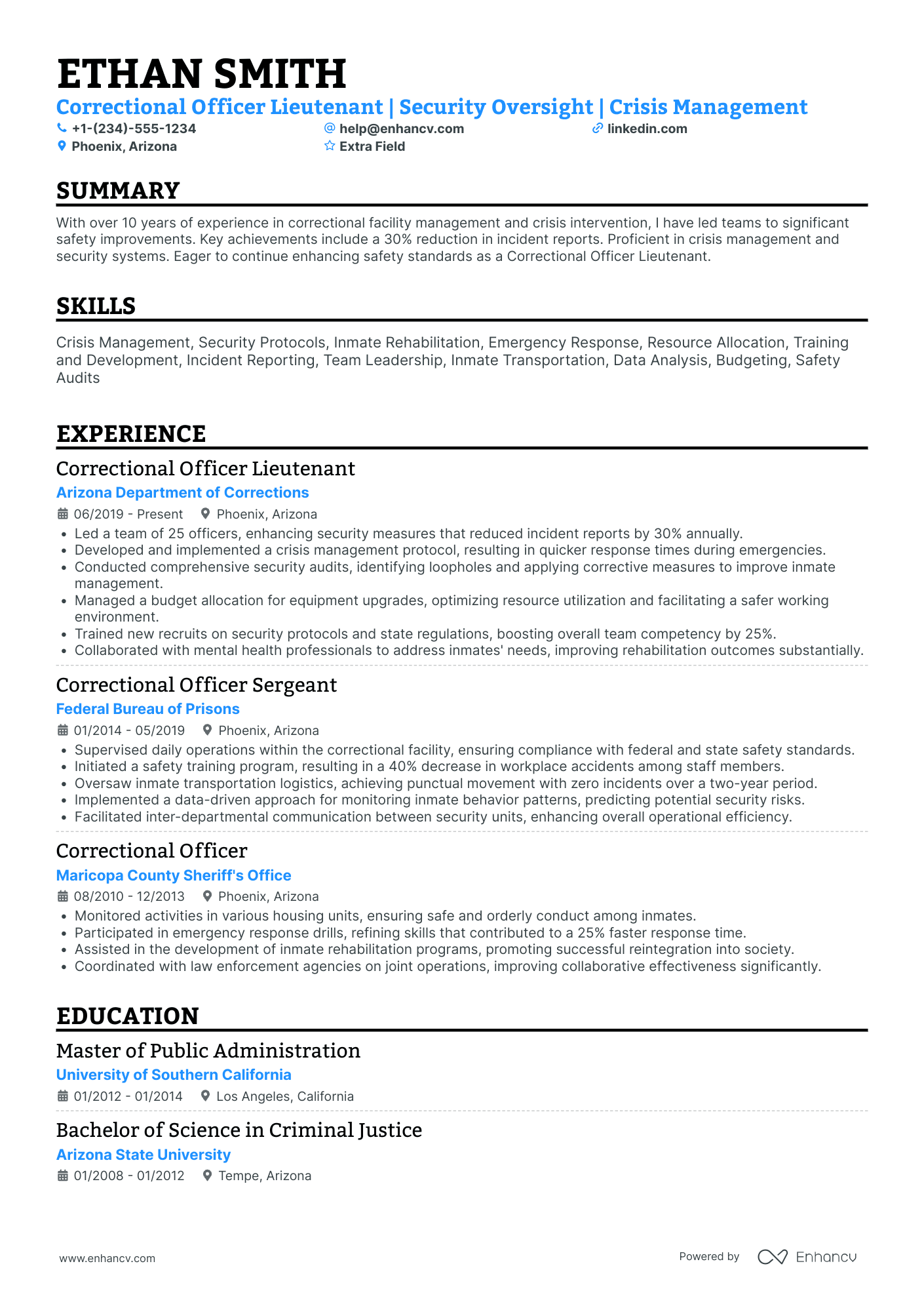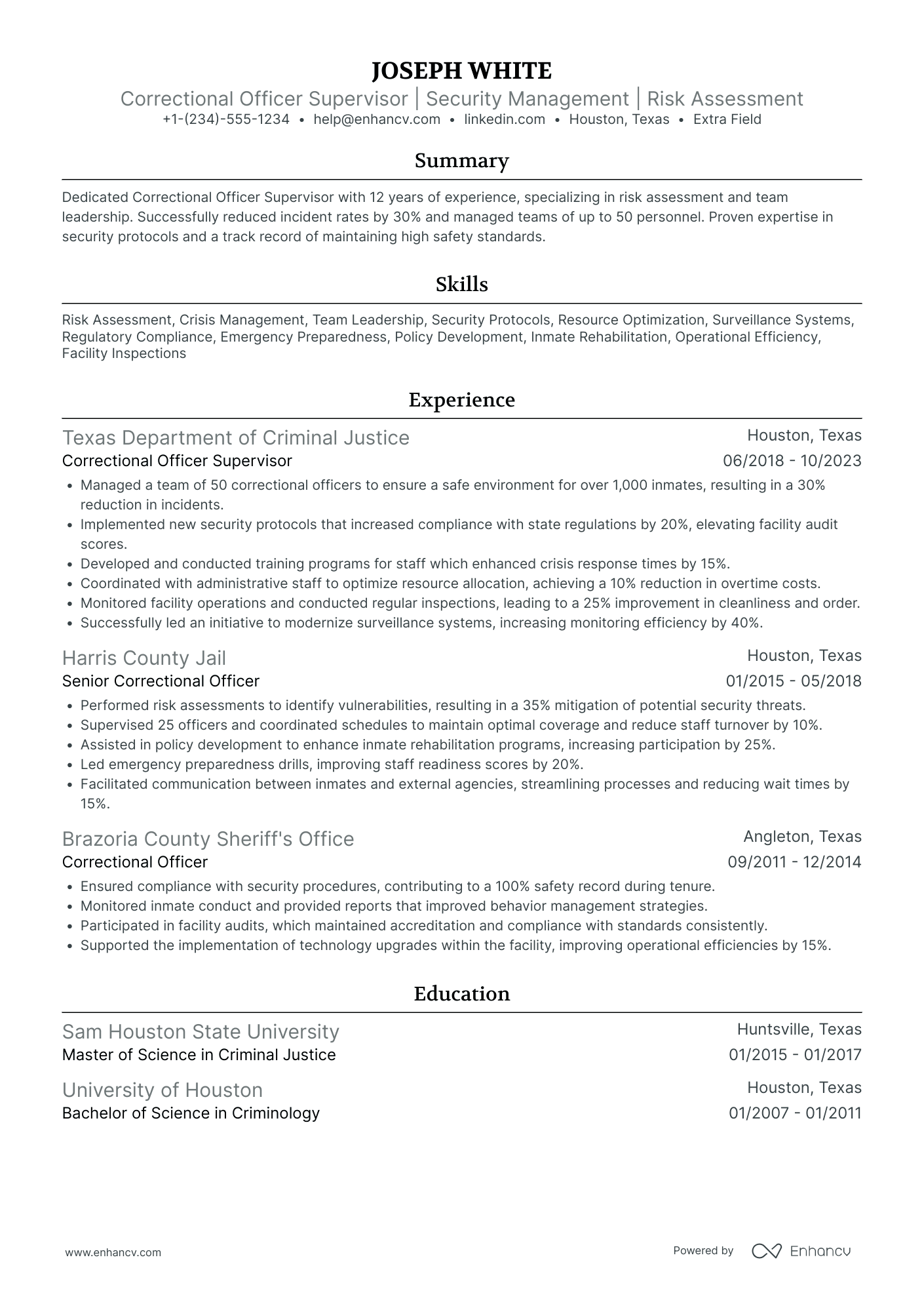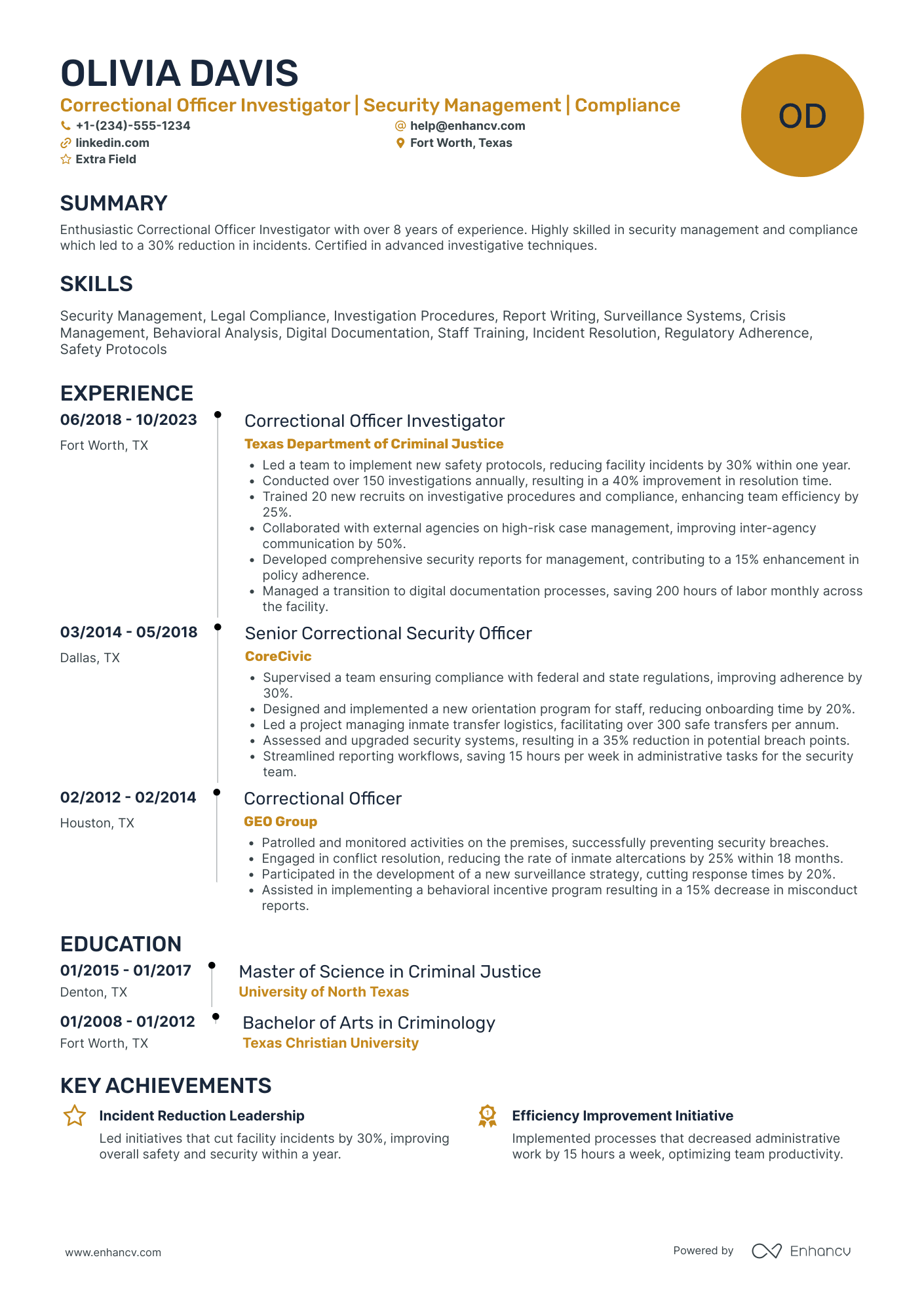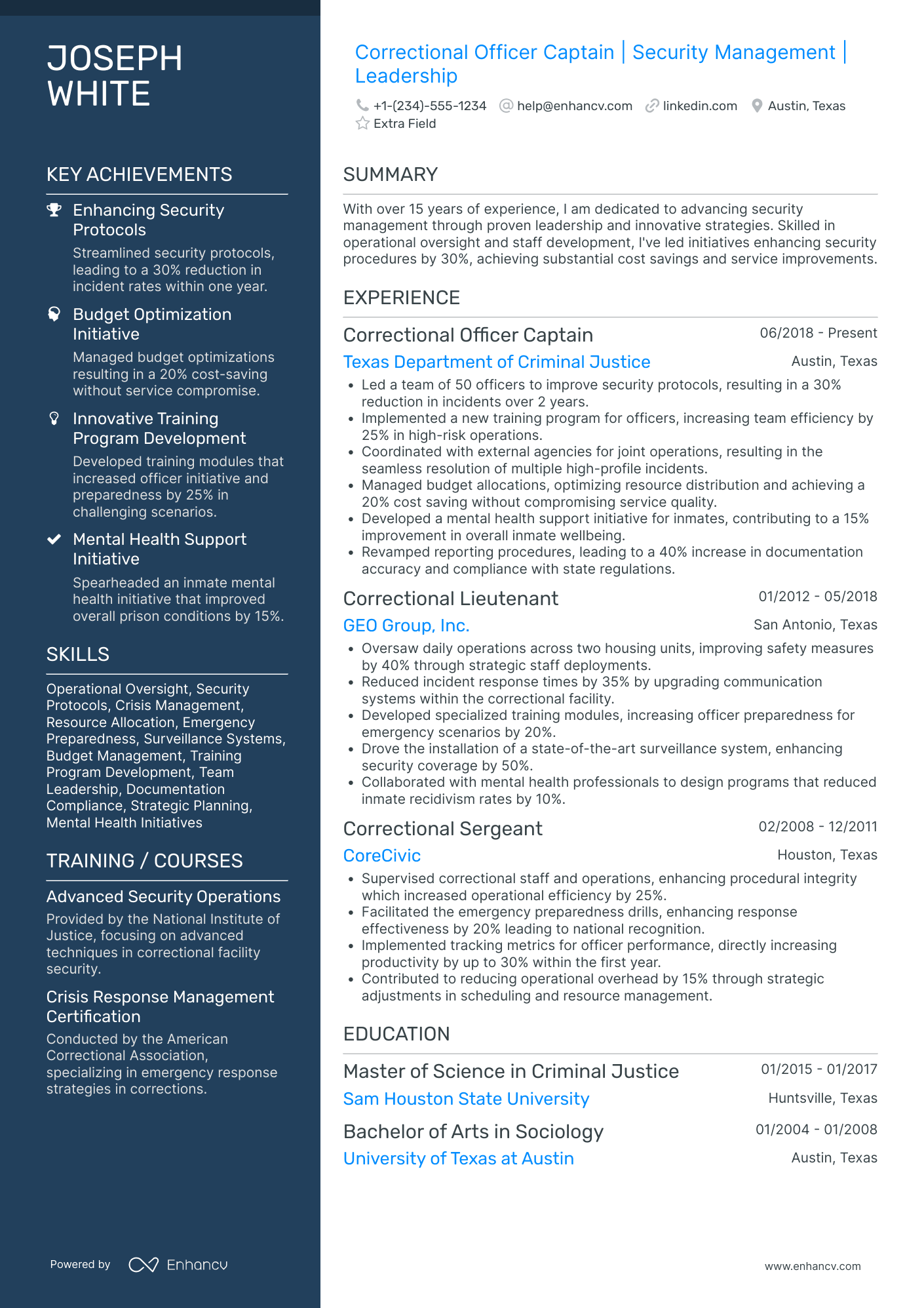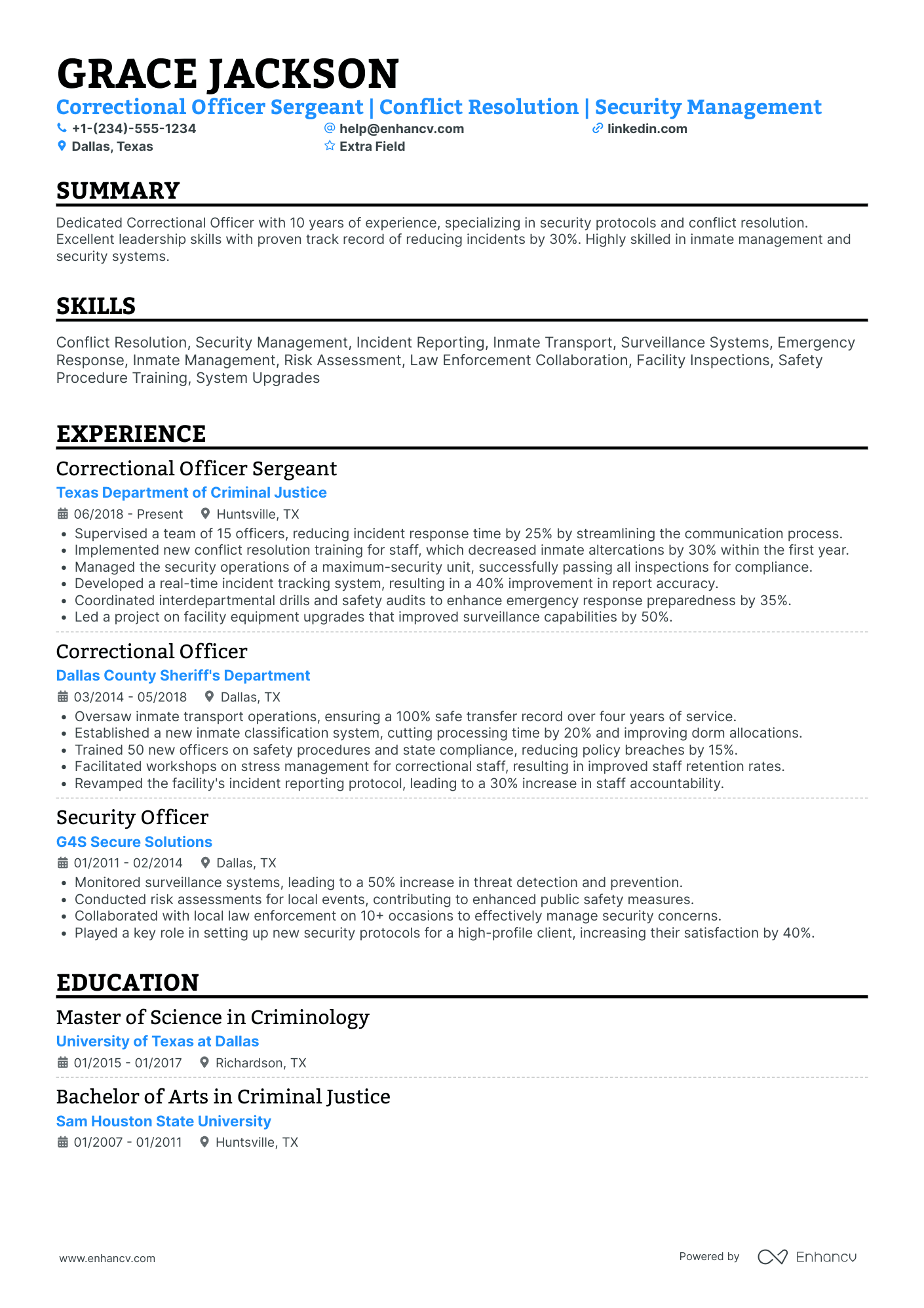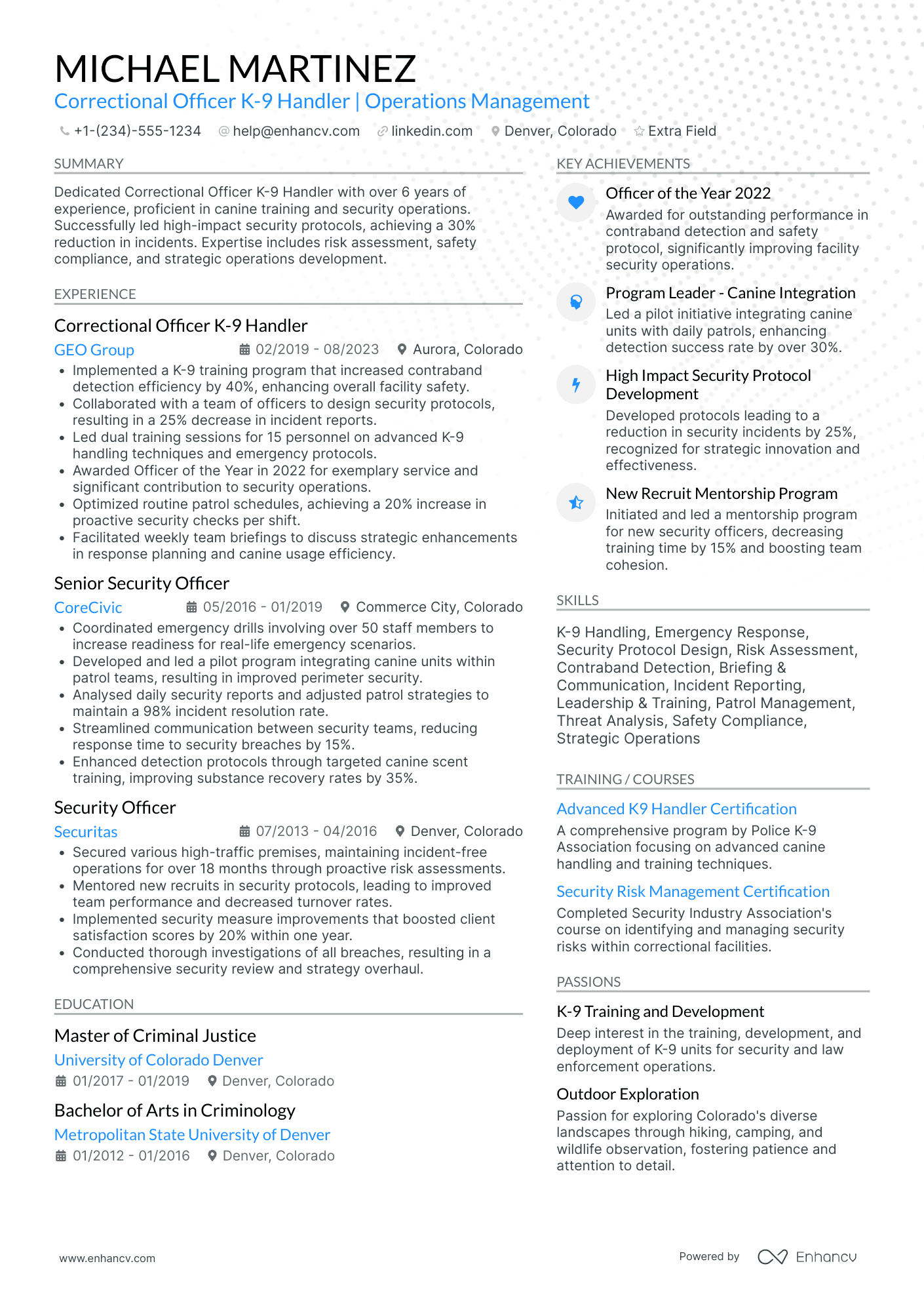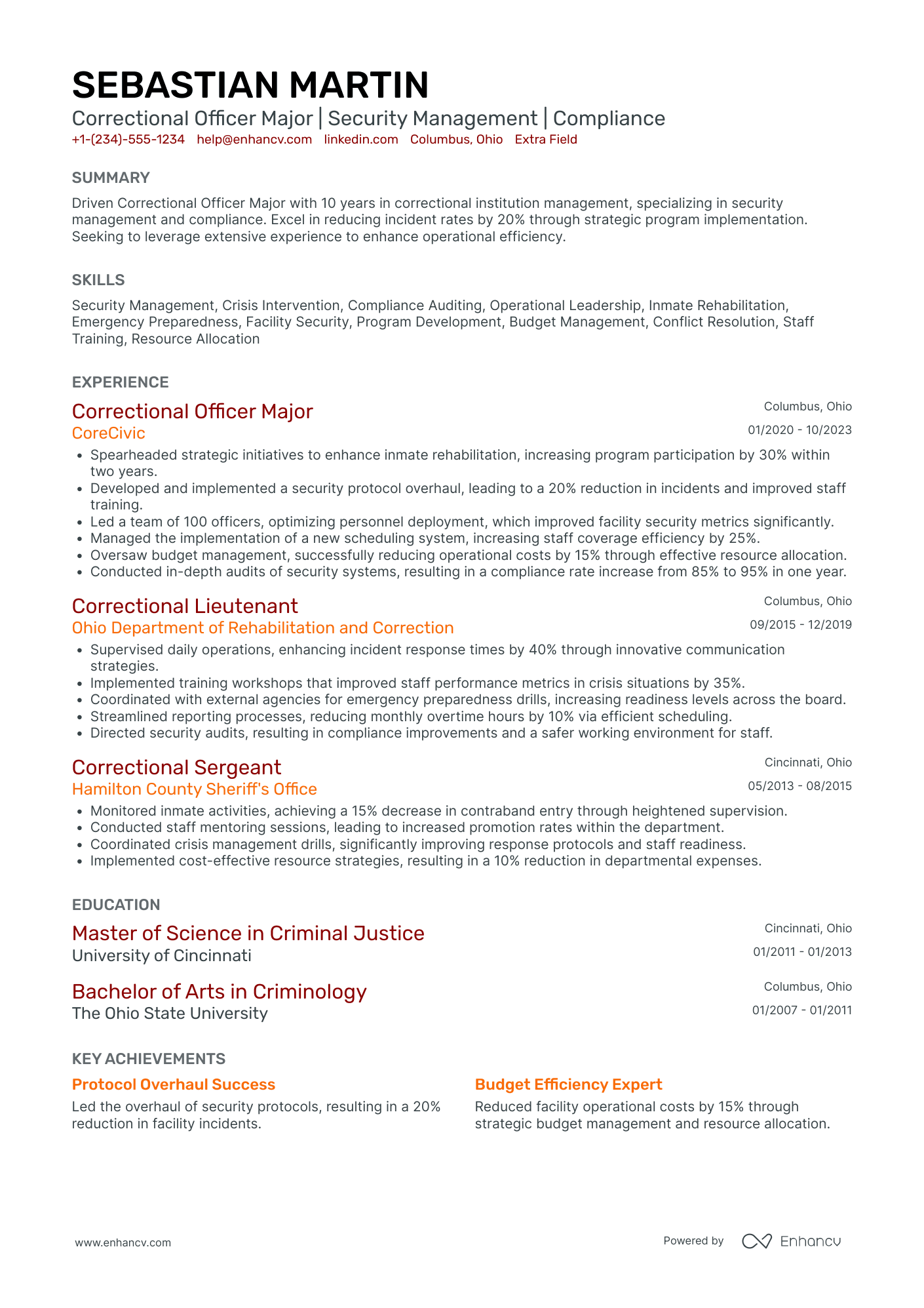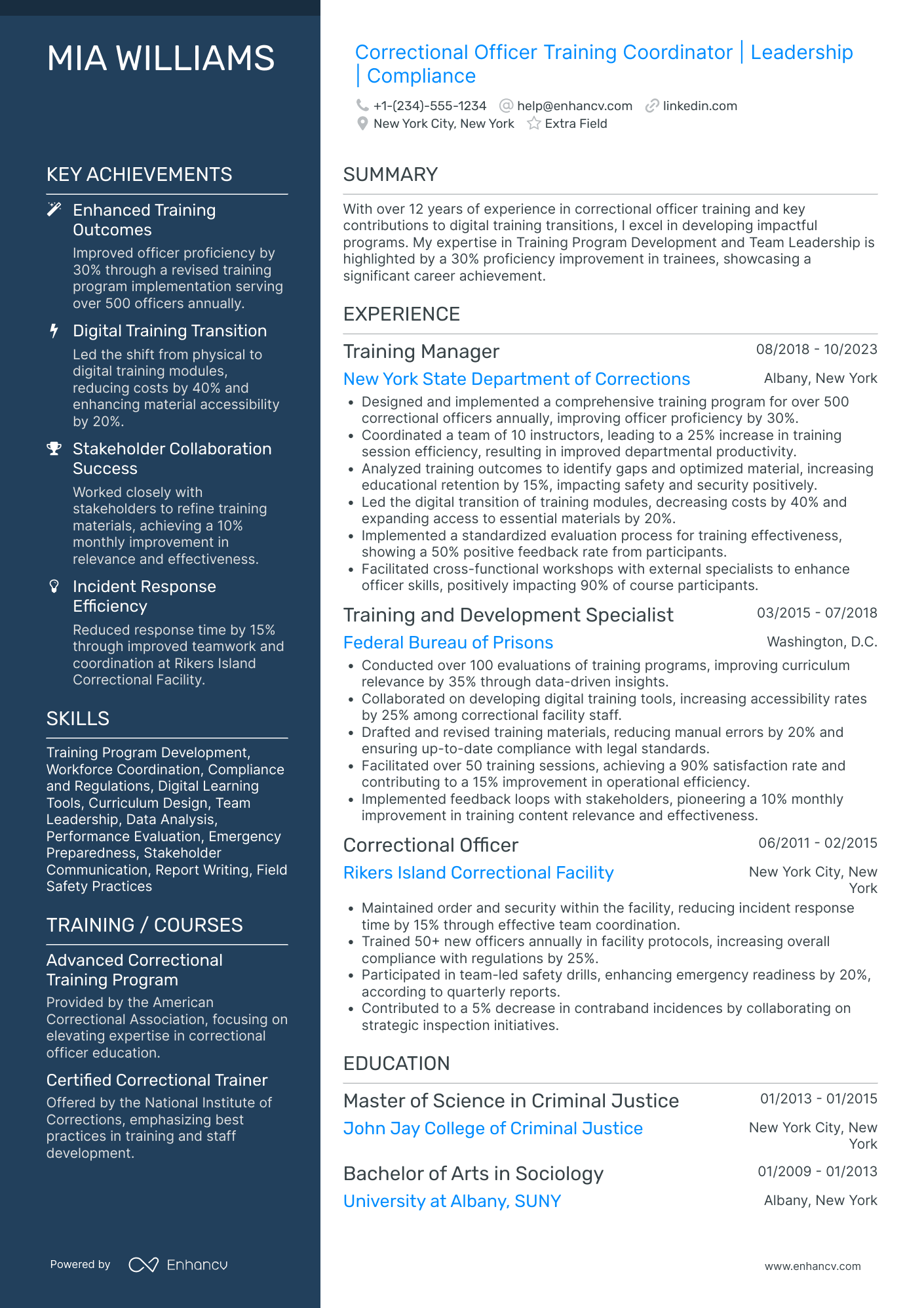Many correctional officer resume drafts fail because they read like post orders, not proof of safe, consistent decision-making under pressure. That hurts when an ATS (applicant tracking system) filters fast and recruiters scan in seconds.
A strong resume shows results you delivered, not just tasks you performed. Highlight reduced incident rates, de-escalations completed, contraband finds, accurate counts across units, report accuracy, and on-time inmate movement. Show training impact, audit outcomes, and safety compliance. If you're unsure where to begin, learning how to write a resume that emphasizes achievements over duties is the essential first step.
Key takeaways
- Quantify safety outcomes like incident reduction, count accuracy, and contraband finds in every bullet.
- Use reverse-chronological format for experienced officers and hybrid format for career changers.
- Mirror the job posting's exact terminology for systems, protocols, and facility types.
- Demonstrate skills through measurable results in your experience section, not just a keyword list.
- Place certifications above education when they're recent or required for the target role.
- Write a three-to-four-line summary featuring your facility type, core skills, and a key metric.
- Use Enhancv's tools to tighten bullet language and align your resume with each posting faster.
Job market snapshot for correctional officers
We analyzed 629 recent correctional officer job ads across major US job boards. These numbers help you understand regional hotspots, skills in demand, employer expectations at a glance.
What level of experience employers are looking for correctional officers
| Years of Experience | Percentage found in job ads |
|---|---|
| 1–2 years | 2.4% (15) |
| 3–4 years | 0.2% (1) |
| 10+ years | 45.3% (285) |
| Not specified | 51.8% (326) |
Correctional officer ads by area of specialization (industry)
| Industry (Area) | Percentage found in job ads |
|---|---|
| Government | 87.0% (547) |
| Healthcare | 7.2% (45) |
| Education | 3.5% (22) |
| Finance & Banking | 2.4% (15) |
Top companies hiring correctional officers
| Company | Percentage found in job ads |
|---|---|
| State of Florida | 28.0% (176) |
| State of North Carolina | 15.9% (100) |
| Department Of Justice | 8.4% (53) |
| State of Washington | 4.1% (26) |
| CoreCivic | 4.0% (25) |
| State of Arizona | 3.7% (23) |
| State of Georgia | 3.0% (19) |
| State of Indiana | 2.9% (18) |
| State of Pennsylvania | 2.7% (17) |
| State of Tennessee | 2.5% (16) |
Role overview stats
These tables show the most common responsibilities and employment types for correctional officer roles. Use them to align your resume with what employers expect and to understand how the role is structured across the market.
Day-to-day activities and top responsibilities for a correctional officer
| Responsibility | Percentage found in job ads |
|---|---|
| Situational awareness | 2.7% (17) |
| Record keeping | 2.4% (15) |
| Conflict management | 1.7% (11) |
| Report writing | 1.7% (11) |
| Attention to detail | 1.6% (10) |
| Juvenile corrections | 1.6% (10) |
| Observation | 1.6% (10) |
| Reasoning | 1.6% (10) |
| Security | 1.6% (10) |
| Written communication | 1.6% (10) |
| Cpr | 1.4% (9) |
| Criminology/criminal justice | 1.4% (9) |
How to format a correctional officer resume
Recruiters hiring correctional officers prioritize safety training, certifications, inmate management experience, and the ability to maintain order in high-pressure environments. A clean, well-structured resume format ensures these critical qualifications surface quickly during both human review and applicant tracking system (ATS) scans.
I have significant experience in this role—which format should I use?
Use a reverse-chronological format to present your correctional experience in a clear, linear progression that highlights growing responsibility. Do:
- Lead with your most recent facility assignment, specifying unit size, security classification level, and scope of supervisory duties.
- Feature role-specific credentials such as use-of-force certifications, crisis intervention training, CPR/First Aid, and proficiency with restraint systems or surveillance technology.
- Quantify outcomes tied to safety, compliance, and operational efficiency to demonstrate measurable impact.
I'm junior or switching into this role—what format works best?
A hybrid format works best because it lets you lead with relevant skills and training while still showing a concise work history that provides context. Do:
- Place a skills section near the top of the page featuring competencies such as conflict de-escalation, emergency response, report writing, and institutional policy compliance.
- Include any transitional experience—military service, security work, law enforcement internships, or criminal justice coursework—that connects directly to correctional duties.
- Link every skill or action to a concrete result so hiring managers can see practical application, not just theoretical knowledge.
Why not use a functional resume?
A functional format strips away the facility context, timeline, and supervisory structure that hiring managers need to verify you can handle the day-to-day realities of a correctional environment.
- Career changers with no correctional experience: If you're transitioning from military police, private security, or another protective services role and need to foreground transferable skills over an unrelated job history.
- Candidates with significant employment gaps: If personal circumstances created a gap but you maintained relevant certifications or completed correctional officer training during that time.
- Recent criminal justice graduates: If your work history is limited but you completed practicum hours, ride-alongs, or facility observation programs.
With the right format in place, the next step is filling each section with content that highlights your qualifications for the role.
What sections should go on a correctional officer resume
Recruiters expect to see clear proof you can maintain safety, enforce policy, and document incidents accurately in a secure facility. Knowing what to put on a resume for correctional roles ensures you don't miss critical details.
Use this structure for maximum clarity:
- Header
- Summary
- Experience
- Skills
- Projects
- Education
- Certifications
- Optional sections: Awards, leadership, volunteering
Strong experience bullets should emphasize measurable safety outcomes, incident volume and severity, compliance results, and the scope of units, shifts, and inmate populations you supported.
Is your resume good enough?
Drop your resume here or choose a file. PDF & DOCX only. Max 2MB file size.
Once you’ve organized your resume with the right core components, the next step is to write your correctional officer resume experience in a way that supports those sections with clear, job-relevant detail.
How to write your correctional officer resume experience
Your work experience section proves you can maintain facility security, manage inmate populations, and handle high-pressure situations with consistent professionalism. Hiring managers prioritize demonstrated impact—measurable reductions in incidents, improved compliance outcomes, and effective use of correctional protocols—over generic task descriptions.
Each entry should include:
- Job title
- Company and location (or remote)
- Dates of employment (month and year)
Three to five concise bullet points showing what you owned, how you executed, and what outcomes you delivered:
- Ownership scope: the housing units, inmate populations, facility zones, or security operations you were directly accountable for during each shift or assignment.
- Execution approach: the correctional procedures, restraint techniques, surveillance systems, crisis intervention methods, or reporting protocols you applied to maintain order and ensure safety.
- Value improved: changes to incident rates, contraband detection, inmate compliance, facility safety standards, emergency response times, or regulatory audit readiness resulting from your work.
- Collaboration context: how you coordinated with fellow officers, administrative staff, medical teams, mental health professionals, legal personnel, or external law enforcement agencies to address facility needs.
- Impact delivered: outcomes tied to safer facility operations, reduced use-of-force events, stronger policy adherence, improved staff retention within your unit, or successful completion of accreditation requirements.
Experience bullet formula
A correctional officer experience example
✅ Right example - modern, quantified, specific.
Correctional Officer
Riverbend Correctional Facility | Nashville, TN
2021–Present
Medium-security state facility housing 1,200 incarcerated individuals with a focus on safety, rehabilitation, and reentry.
- Enforced housing-unit security using direct supervision, handheld radios, and body-worn camera protocols, cutting contraband finds by 18% through targeted shakedowns and evidence-based search patterns.
- Documented incidents, grievances, and use-of-force reports in the Offender Management System (OMS) and digital logbooks, improving report completion within policy timelines from 82% to 97% and reducing supervisor rework by 25%.
- De-escalated high-risk conflicts with Crisis Intervention Team (CIT) techniques and verbal judo, reducing Code responses in assigned unit by 22% and lowering average response time by forty-five seconds via clearer radio traffic.
- Coordinated inmate movement and counts with shift supervisors, medical, and classification staff using count sheets, key control logs, and CCTV monitoring, sustaining 99.8% count accuracy across 300+ daily movements.
- Trained eight new officers on post orders, PREA (Prison Rape Elimination Act) reporting, and restraint application standards, decreasing first-ninety-day policy violations by 30% and improving field training sign-off rates to 100%.
Now that you've seen how a strong experience section comes together, let's look at how to adjust those details to match the specific correctional officer role you're applying for.
How to tailor your correctional officer resume experience
Recruiters evaluate your correctional officer resume through both applicant tracking systems and manual review. Tailoring your resume to the job description ensures your qualifications stand out in both screening methods.
Ways to tailor your correctional officer experience:
- Match specific security technologies or monitoring systems named in the posting.
- Use the exact terminology for facility protocols or operational procedures listed.
- Mirror inmate management metrics or performance benchmarks the employer references.
- Include your experience with the facility type or custody level specified.
- Emphasize compliance standards or regulatory frameworks the job description highlights.
- Reflect the supervision model or team structure described in the posting.
- Align your crisis intervention or de-escalation methods with those requested.
- Highlight report writing or documentation practices the employer prioritizes.
Tailoring means aligning your real accomplishments with what the employer asks for, not forcing keywords where they don't belong.
Resume tailoring examples for correctional officer
| Job description excerpt | Untailored | Tailored |
|---|---|---|
| Conduct routine security checks and inmate headcounts per facility protocol, maintaining accurate logs in the Offender Management System (OMS). | Performed regular security duties and kept records. | Conducted scheduled security checks and inmate headcounts across a 200-bed housing unit, logging all activity in the Offender Management System (OMS) with 100% documentation compliance over 12 months. |
| Respond to institutional emergencies, including use of restraint techniques and crisis intervention consistent with ACA standards. | Handled emergencies and helped maintain order in the facility. | Responded to 30+ institutional emergencies annually, applying certified restraint techniques and crisis intervention protocols aligned with American Correctional Association (ACA) standards, contributing to a 15% reduction in use-of-force incidents. |
| Supervise inmate movement and enforce facility rules while supporting rehabilitative programming and reentry services. | Supervised inmates and enforced rules on a daily basis. | Supervised daily movement of 150+ inmates across housing, dining, and program areas while coordinating with case managers to ensure 90% inmate attendance in court-mandated rehabilitative and reentry programs. |
Once you’ve aligned your experience with the role’s priorities, quantify your correctional officer achievements to show the scope and impact of that work.
How to quantify your correctional officer achievements
Quantifying your achievements proves you kept people safe and operations compliant. Focus on incident reduction, response time, contraband finds, accurate counts, and training or audit outcomes across your assigned units and shifts.
Quantifying examples for correctional officer
| Metric | Example |
|---|---|
| Incident reduction | "Reduced inmate-on-inmate incidents by 18% in six months by tightening tier checks and coordinating de-escalation plans with mental health staff." |
| Response time | "Cut average emergency response time from four minutes to two minutes across two housing units by standardizing radio callouts and post coverage." |
| Contraband control | "Recovered twenty-seven contraband items in one quarter using targeted cell searches, metal detector screening, and chain-of-custody documentation." |
| Count accuracy | "Maintained 99.8% count accuracy over twelve months by enforcing count procedures and reconciling movement logs during shift change." |
| Compliance audits | "Passed three unannounced PREA compliance audits with zero major findings by updating logs daily and documenting rounds in the jail management system." |
Turn your everyday tasks into measurable, recruiter-ready resume bullets in seconds with Enhancv's Bullet Point Generator.
Once you've crafted strong bullet points for your experience section, it's equally important to highlight the specific hard and soft skills that qualify you for a correctional officer role.
How to list your hard and soft skills on a correctional officer resume
Your skills section shows you can maintain safety and compliance under pressure, and recruiters and an ATS (applicant tracking system) scan this section to confirm core capabilities; aim for a hard skills-heavy mix supported by job-specific soft skills. correctional officer roles require a blend of:
- Product strategy and discovery skills.
- Data, analytics, and experimentation skills.
- Delivery, execution, and go-to-market discipline.
- Soft skills.
Your skills section should be:
- Scannable (bullet-style grouping).
- Relevant to the job post.
- Backed by proof in experience bullets.
- Updated with current tools.
Place your skills section:
- Above experience if you're junior or switching careers.
- Below experience if you're mid/senior with strong achievements.
Hard skills
- Inmate counts and census control
- Cell searches, contraband detection
- Restraints, handcuffing, escort procedures
- Use-of-force continuum compliance
- Incident reports, disciplinary write-ups
- Offender management systems, case notes
- Radio codes, emergency communications
- Key control, tool inventory logs
- Intake, booking, classification support
- Suicide prevention monitoring protocols
- PREA compliance procedures
- First aid, CPR, AED
Soft skills
- De-escalate volatile situations
- Set and enforce boundaries
- Make rapid, defensible decisions
- Give clear, direct commands
- Stay calm under provocation
- Document objectively and neutrally
- Coordinate with shift partners
- Escalate risks early
- Maintain professional vigilance
- Follow chain of command
- Resolve conflicts between inmates
- Communicate with medical and mental health staff
How to show your correctional officer skills in context
Skills shouldn't live only in a bulleted list on your resume. Browse resume skills examples to see how correctional officers present their abilities effectively.
They should be demonstrated in:
- Your summary (high-level professional identity)
- Your experience (proof through outcomes)
Here's how that looks in practice.
Summary example
Senior correctional officer with 12 years in maximum-security environments. Skilled in crisis de-escalation, inmate classification systems, and contraband detection protocols. Reduced facility incident rates by 31% through proactive behavioral monitoring and staff coordination.
- Reflects senior-level experience clearly
- Names role-specific tools and methods
- Includes a measurable outcome
- Highlights leadership and soft skills
Experience example
Senior Correctional Officer
Riverside State Correctional Institution | Harrisburg, PA
March 2017–Present
- Supervised a 240-bed housing unit, coordinating with case managers to reduce inmate grievances by 27% over two years.
- Implemented updated contraband screening procedures using body scanner technology, increasing detection rates by 43%.
- Mentored eight junior officers on de-escalation tactics, contributing to a 19% drop in use-of-force incidents facility-wide.
- Every bullet includes measurable proof
- Skills appear naturally through outcomes
Once you’ve demonstrated your relevant abilities through specific examples and outcomes, the next step is applying that approach to a correctional officer resume when you don’t have direct experience.
How do I write a correctional officer resume with no experience
Even without full-time experience, you can demonstrate readiness through:
- Criminal justice coursework and labs
- Campus security or patrol shifts
- Volunteer crisis intervention hotline
- CERT emergency response training
- Ride-alongs with local sheriff
- Conflict de-escalation workshop facilitation
- Chain-of-custody evidence handling
- Report writing for student organization
Focus on:
- Safety procedures and incident reporting
- Policy compliance and documentation accuracy
- De-escalation training with outcomes
- Shift-based reliability and attendance
For a deeper guide on building your application from scratch, see how to write a resume without work experience.
Resume format tip for entry-level correctional officer
Use a combination resume format to highlight training, certifications, and relevant projects before work history, so recruiters see job-ready skills fast. Do:
- Add a "Training and Certifications" section near the top.
- Write bullets with tools, tasks, and results.
- Mirror posting keywords like "counts" and "reports."
- Include shift availability and cleared background status.
- Quantify work: hours, incidents, or accuracy.
- Completed forty hours of CERT training, ran three incident simulations, and improved team accountability time by twenty percent using standardized checklists and radio protocols.
Even without direct experience, your educational background can strengthen your candidacy—so presenting it effectively on your resume is essential.
How to list your education on a correctional officer resume
Your education section helps hiring teams confirm you have the foundational knowledge needed for correctional officer work. It validates your academic background quickly and efficiently.
Include:
- Degree name
- Institution
- Location
- Graduation year
- Relevant coursework (for juniors or entry-level candidates)
- Honors & GPA (if 3.5 or higher)
Skip month and day details—list the graduation year only.
Here's a strong education entry tailored for a correctional officer resume.
Example education entry
Bachelor of Science in Criminal Justice
Florida Atlantic University, Boca Raton, FL
Graduated 2021
GPA: 3.7/4.0
- Relevant coursework: Correctional Systems, Criminal Law, Crisis Intervention, and Offender Rehabilitation
- Honors: Magna Cum Laude, Dean's List (six consecutive semesters)
How to list your certifications on a correctional officer resume
Certifications on your resume show your commitment to learning, proficiency with safety tools and procedures, and relevance to correctional officer standards and regulations.
Include:
- Certificate name
- Issuing organization
- Year
- Optional: credential ID or URL
- Place certifications below education when they are older, less relevant, or you need education to lead your qualifications.
- Place certifications above education when they are recent, highly relevant, or required for the correctional officer role you target.
Best certifications for your correctional officer resume
- CPR and AED Certification
- First Aid Certification
- Crisis Intervention Team (CIT) Certification
- OC Spray (Pepper Spray) Certification
- Firearms Qualification Certification
- Defensive Tactics Certification
- PREA (Prison Rape Elimination Act) Training Certification
Once you’ve presented your credentials in a clear, easy-to-scan format, use the resume summary to highlight how those qualifications support your fit for the role.
How to write your correctional officer resume summary
Your resume summary is the first thing a recruiter reads. A strong one immediately signals you're qualified and ready to maintain facility safety.
Keep it to three to four lines, with:
- Your title and total years of correctional or law enforcement experience.
- The facility type you've worked in, such as county jails, state prisons, or federal institutions.
- Core skills like inmate supervision, conflict de-escalation, emergency response, and report writing.
- One or two measurable achievements, such as incident reduction rates or successful audit results.
- Soft skills tied to real outcomes, like communication that resolved housing disputes or teamwork that improved unit safety.
PRO TIP
At the entry or mid-level, emphasize your hands-on skills, relevant certifications, and early wins on the job. Highlight specific tools you've used, such as booking systems or surveillance equipment. Avoid vague phrases like "passionate about public safety" or "hardworking team player." Instead, connect every detail to a concrete result or responsibility.
Example summary for a correctional officer
Correctional officer with three years of experience in a 500-bed county facility. Skilled in inmate supervision, crisis intervention, and incident reporting. Reduced housing unit infractions by 18% through consistent protocol enforcement.
Optimize your resume summary and objective for ATS
Drop your resume here or choose a file.
PDF & DOCX only. Max 2MB file size.
Now that you've crafted a summary that highlights your qualifications, make sure the header above it presents your contact details correctly so recruiters can actually reach you.
What to include in a correctional officer resume header
A resume header lists your key identifying and contact details, and it matters for a correctional officer because it boosts visibility, credibility, and recruiter screening speed.
Essential resume header elements
- Full name
- Tailored job title and headline
- Location
- Phone number
- Professional email
- GitHub link
- Portfolio link
A LinkedIn link helps recruiters verify your experience quickly and supports screening.
Don't include a photo on a correctional officer resume unless the role is explicitly front-facing or appearance-dependent.
Match your header job title to the posting and keep your contact details consistent across your resume, LinkedIn, and background check records.
Example
Correctional officer resume header
Jordan M. Rivera
Correctional Officer | Facility Security, Inmate Supervision, Incident Reporting
Phoenix, AZ
(602) 555-78XX
your.name@enhancv.com github.com/yourname yourwebsite.com linkedin.com/in/yourname
Once your contact details and role information are set at the top, add additional sections to strengthen the rest of your correctional officer resume with relevant supporting details.
Additional sections for correctional officer resumes
Adding extra sections helps you stand out when your core qualifications match other applicants closely. Choose sections that reinforce your credibility, physical readiness, or specialized training for correctional environments.
- Languages — listing language skills on your resume can be a major asset in multilingual facility environments.
- Certifications and licenses
- Volunteer experience
- Professional affiliations
- Physical fitness achievements
- Continuing education and training
Once you've rounded out your resume with relevant additional sections, pair it with a strong cover letter to give hiring managers the full picture of your qualifications.
Do correctional officer resumes need a cover letter
A cover letter isn't required for every correctional officer role, but it often helps. It can matter most in competitive postings, agencies that expect one, or when your resume needs context. If you're unfamiliar with the format, start by understanding what a cover letter is and how it complements your resume.
Use a cover letter to add details your correctional officer resume can't show:
- Explain role and team fit by matching your experience to the facility type, shift needs, and custody level in the posting.
- Highlight one or two outcomes, such as reducing incidents, improving compliance, or strengthening documentation accuracy through a specific change you led.
- Show you understand the facility's users and context, including inmate populations, safety priorities, and how policy affects daily operations.
- Address career transitions or non-obvious experience by connecting prior work to core correctional officer skills like de-escalation, observation, and report writing.
Drop your resume here or choose a file.
PDF & DOCX only. Max 2MB file size.
Even if you choose to include a cover letter to add context beyond your resume, AI can help you strengthen your correctional officer resume faster and more effectively.
Using AI to improve your correctional officer resume
AI can sharpen your resume's clarity, structure, and impact. It helps tighten language and highlight relevant experience. But overuse strips authenticity. Once your content feels clear and role-aligned, step away from AI. If you're wondering which AI is best for writing resumes, focus on tools that refine rather than replace your own words.
Here are 10 practical prompts to strengthen specific sections of your correctional officer resume:
Strengthen your summary
Quantify experience bullets
Tighten action verbs
Align skills section
Improve certification details
Refine education entries
Clarify project contributions
Remove redundant phrasing
Target a promotion
Fix inconsistent formatting
Conclusion
A strong correctional officer resume shows measurable outcomes, role-specific skills, and a clear structure. Use numbers to prove results, such as fewer incidents, faster counts, or stronger compliance. Highlight safety, de-escalation, documentation, and teamwork.
Keep each section easy to scan and aligned with the correctional officer role. This approach shows readiness for today’s hiring market and near-future needs. It helps employers see your impact, judgment, and fit at a glance.
